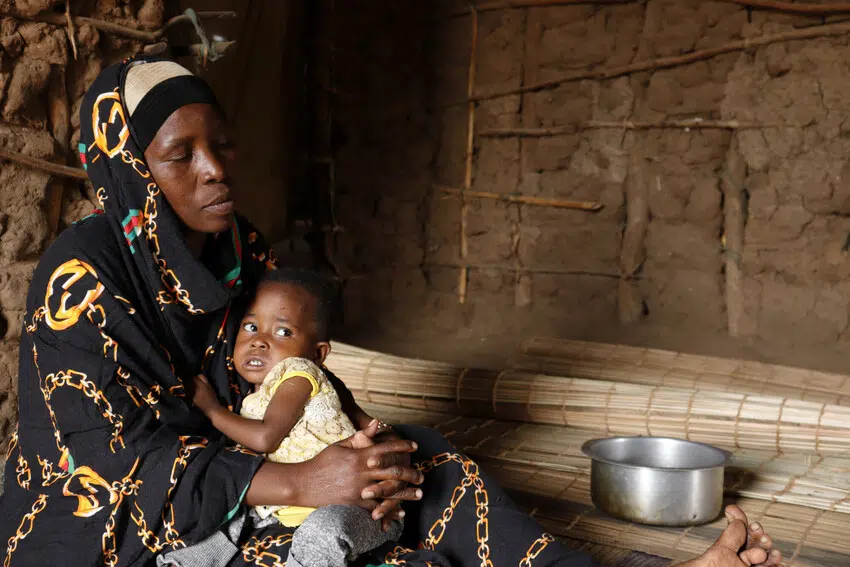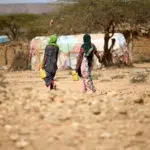Media Centre - Media release - 24 September 2022
Plan International Australia welcomes Australian Government’s funding announcement for famine in Africa

Humanitarian organisation and girls’ rights charity Plan International Australia welcomes the Australian federal government’s decision today to commit $15 million in desperately needed emergency assistance to the hunger crisis in the Horn of Africa and Yemen.
With UN officials declaring Somalia is just weeks away from an official declaration of famine, and countries such as South Sudan, Ethiopia and Kenya suffering from crushing food shortages, this is an important first step from the Albanese government, however much more is required to prevent millions of people from dying of starvation.
Globally, one person are currently dying of hunger every four seconds, and 50 million people in 45 countries are on the brink of famine. There are 828 million people going hungry every night.
In Somalia, communities that Plan International works with say they are enduring the worst hunger they have experienced in their lifetimes, with an estimated 213,000 people classed as being at IPC level 5 – meaning they face catastrophic hunger and starvation. This emergency is only likely to get even worse, with forecasts now predicting that October could bring an unprecedented fifth consecutive failed rainy season. Already, nearly 920,000 people in the country have been forced to leave their homes in search of food and water.
The levels of food insecurity the world is facing is unprecedented, driven by a ‘perfect storm’ of Covid-19, the climate crisis and conflict, particularly in Ukraine. In its first year alone, the pandemic pushed an additional 300 people worldwide into hunger every minute.
Due to the severity of the global hunger situation, Plan International has declared the Hunger Crisis as a Red Alert Level emergency. Focusing on eight priority countries – Kenya, Ethiopia, Somalia, South Sudan, Mali, Burkina Faso, Niger and Haiti – hunger is now the number one priority for the organisation.
The Government’s assistance will deliver food, water and other essential support through the World Food Programme and the Emergency Action Alliance.
Plan International Australia CEO Susanne Legena said:
“This is a welcome and very important first step from the Australian Government, however it is far short of the $150 million that is needed and that we have long been calling for to prevent a crisis of this magnitude.
“A recent Plan International report found that the equivalent of 24 children – a typical Australian school class – die every three and a half minutes of hunger-related causes. Between school starting at 9am and recess at 11.30am, the equivalent of 60 classrooms will die of starvation.
“An estimated 45 million children under the age of five currently suffer from wasting, the deadliest form of malnutrition, which increases children’s risk of death by up to 12 times. That is shocking and as a wealthy and diverse, multi-cultural country, it is Australia’s duty to do more.
“We are really at the tipping point for famine and if the world does not urgently step up life-saving humanitarian assistance, we are going to see a lot of death.
“Every day, we are hearing absolutely devastating accounts from our colleagues and friends in these hunger hotspots, incredible people who are dedicating their lives to help stop this crisis. Parents having to make the painful decision to marry their 14-year-old daughters because they have no other option left to put food on the table. Desperate mothers bringing terribly sick children to malnutrition clinics. Nothing is more painful than for a mother to watch helplessly as her child is starving.
“We now have a very brief window of time to save as many lives as possible. We urgently need more support from donors so that we can reach more children, especially girls, and their families before it’s too late.”
A “double crisis” for girls
Girls and young women face heightened risks in situations of food insecurity. In times of crisis, girls are the first to be taken out of school and the last to be fed when food runs low.
Child marriage is further fuelled by crises such as hunger and starvation. In South Sudan, a Plan International assessment found that 4 million girls have been affected by early or forced marriage so far in 2022, an increase from 2.7 million in all of 2021. More than half of all girls in South Sudan are married before they turn 18.
Girls are also caught in a double crisis of hunger and violence in many places. In a recent needs assessment of 635 people in Somalia, girls and women interviewed said rape and other forms of sexual and gender-based violence were rising as food insecurity worsened. A third (34%) of people surveyed believe security risks – including rape, domestic violence, female genital mutilation (FGM) and child marriage – to girls and women have increased as a result of the drought.
One 13-year-old girl living in Somalia told Plan International that her biggest fear is being sent to the city to work or being married off in exchange for money: “Whenever I see a man speaking with my mother, I get scared thinking that I am the deal.”Plan International Australia is calling on the government to deliver an urgent $150 million Famine Prevention Package, alongside investing in a long-term, targeted Global Food Security Strategy.
[ENDS]
Notes to editors:
- Plan International is working in many of the countries bearing the brunt of this global food crisis. We are rapidly scaling up programmes such as cash and voucher assistance, food distributions, school meals, malnutrition screening and nutrition support. In South Sudan we are scaling up our food distributions in partnership with the World Food Programme, providing lifesaving supplementary feeding to pregnant and lactating mothers and children under five.
- Where possible across our food response programs we are providing cash or vouchers so families are able to buy food themselves so girls do not drop out of school to support families either by working or by looking after siblings. Where schools have closed, we are adapting and increasing school feeding programs so children are still able to eat when at home, allowing them more time to continue studying remotely where possible.
- We are scaling up protection mechanisms at the community level to respond to the increase in protection and child protection concerns and where we are distributing food directly, we are ensuring a protective environment for women and girls.
Media contacts


